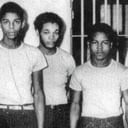New York Times
By FRANK RICH
OP-ED
Only in America could they throw an execution like this.
On eBay, dozens of bidders have vied in auctions like the one inviting them to “commemorate the final days of America’s worst terrorist” with a “colorful T‑shirt.” The folks at PETA, never content to leave well enough alone, have demanded that Timothy McVeigh’s last meal be meat-free, prompting Mr. McVeigh to write them a letter suggesting that since his “time is short,” they should proselytize Ted Kaczynski instead. Though an effort by the Internet pornographer who runs “Voyeur Dorm” to merchandise the execution as a live $1.95 Webcast was derailed in court, such video could yet proliferate on the Web anyway, not unlike the Tommy Lee-Pamela Anderson sex tape. By boasting about “the latest encryption technology” and “state-of-the-art video conferencing,” Attorney General John Ashcroft has all but dared an international army of hackers to hijack the execution transmission he’s sending over 500 miles of telephone lines from the death chamber in Terre Haute to the bombing’s victims and survivors in Oklahoma City.
Mr. Ashcroft has also set the inevitable theme of the weeks between now and May 16: closure, big time. He has said that he hopes his closed- circuit TV show can help Oklahoma City’s bereaved “meet their need to close this chapter in their lives.” He hopes the country can achieve closure, too, by ignoring Timothy McVeigh. To this end, the attorney general has attempted to manage news coverage by forbidding TV interviews with the murderer and by trying to strong-arm the press into minimizing any reportage whatsoever of his final weeks of utterances. Otherwise, Mr. Ashcroft says, the media could become “Timothy McVeigh’s co-conspirator in his assault on America’s public safety and upon America itself.”
Certainly all Americans hope that those who have suffered directly from this tragedy find a measure of peace in any way they can. But the notion that the country has something to gain by sweeping the murder of 168 innocent people and the execution of one guilty person under the rug is something only a platitudinous politician who’s in over his head, like our new attorney general, could dream up. For some national wounds there is never any “closure” — witness the searing, conflicted emotions that rose up in many Americans, whatever their views about Vietnam, as they heard this week about the hidden past of Bob Kerrey. Only by learning from the blood bath in Oklahoma City, in which more Americans were killed than in our last war, in the Persian Gulf, can we grapple with its ghosts.
Already the McVeigh execution has served to deepen our growing national debate about the death penalty. As Sara Rimer of The Times reported this week, even some Oklahoma City victims and survivors have become vocal opponents of capital punishment — despite the efforts of Mr. Ashcroft, a death penalty advocate, to misrepresent all these grieving families as single-minded in their desire for Mr. McVeigh’s obliteration. On Monday, George Ryan, the once pro-capital punishment Republican governor of Illinois who declared a moratorium on executions after repeated exonerations of death row inmates, said he’s now “struggling” over the issue and could not “throw the switch” on Mr. McVeigh.
A parallel, and less predictable, debate has arisen over the issue of televising the execution. Ever since the author Thomas Lynch made an eloquent case on this page in February for the public’s right to see the death being enacted by the state in its name, many anti-death penalty editorialists have seconded it. One common line of argument is that a public execution will cause Americans to question their own support for future executions — though a chilling counterargument has it that a televised execution might go down all too smoothly in a gladiatorial culture where the W.W.F. and “reality” programming like MTV’s “Jackass” and UPN’s “Chains of Love” are prime-time entertainment. It’s worth asking if we can actually tell the difference between reality and “reality” programming anymore. Don Hewitt, whose “60 Minutes” once aired a Kevorkian euthanasia tape, told The Philadelphia Inquirer that broadcasting an execution by lethal injection would be ho-hum. “People watch that on ‘E.R’ every week,” he said. “What’s the big deal?”
But even as we debate the merits of holding or watching executions, there seems to be widespread support for Mr. Ashcroft’s view that we avert our eyes from those of Mr. McVeigh himself. Charles Gibson of ABC News parroted the attorney general when he declared that he would anchor his network’s execution coverage from Oklahoma City rather than Terre Haute because “the more important message is still with the survivors and the victims, and not with the message of this guy.” (Since when is a network news anchor’s job to send a message, let alone by his choice of urban backdrop?) Similarly, the country’s largest retailer, Wal-Mart, has banned the selling of “American Terrorist,” the journalistic account of the bombing written by the 2 Buffalo News reporters who covered the story, Lou Michel and Dan Herbeck. The Army and Air Force Exchange Service, I learned this week, has also elected not to sell the book on military bases — maintaining, according to Maj. Philip Smith, its public affairs officer, that the decision was based only on “sales potential.”
That explanation doesn’t fly. The book is in fact a best seller — No. 2 on The Times’s list — and deservedly so. The authors have woven 150 interviews, including 75 hours’ worth with Mr. McVeigh, into what is likely to stand as the definitive record of the crime and the man who committed it. Though much publicity has attended the book’s revelation of Mr. McVeigh’s abhorrent lack of remorse, as exemplified by his description of the bombing’s child casualties as “collateral damage,” the Ashcroft head-in- the-sand attitude prevails in the relatively scant attention paid to the bulk of the book devoted to the ordinariness of its American terrorist. Mr. McVeigh was not your typical troubled loner who explodes on the nation’s front pages. He was a Buffalo Bills fan, a junkie not for drugs but news, a Catholic of catholic cultural tastes (“Star Wars”) whose unremarkable senior high school yearbook photo inscription read, “Take it as it comes, buy a Lamborghini, California girls.”
The “most disturbing thing about him,” said Mr. Michel, the book’s co- author, in a conversation this week, “is that he’s a 3‑dimensional person. Most people would love to dismiss him as a Charles Manson or Jeffrey Dahmer a flat-line monster with a swastika on his forehead. But he’s a son of suburbia who had every advantage in life.” If anything, Mr. McVeigh, who had a latchkey childhood marked by some bullying, offers “a through line to the school shooters of today,” says Mr. Michel. “It’s to our peril as a society not to try to understand how he went from fairly normal to terrorist. For us to turn our back, and say no, this is just too painful to look at, is to invite the possibility of it happening again.”
According to the psychiatrist hired by his defense attorney, Mr. McVeigh was sane. The rage that he brought home from the Persian Gulf war, in which he was a decorated soldier, was stoked by the insular, itinerant gun-show culture, which fed his Second Amendment absolutism and hatred of government (he considered assassinating Janet Reno). “There are millions of Americans who share his anti-government views,” says Mr. Michel, some of the most extreme of whom are now writing fan letters to the condemned man in prison. Even Mr. McVeigh “calls them kooks and crazies,” adds the writer, who remains in communication with his book’s subject in his final weeks.
Those weeks are going to be filled with the white noise of an all-American circus. Any profiteer or publicity hound that can find his way to Terre Haute will do so, and will soon be dutifully showcased on TV for our delectation. But the false pieties of supposed leaders like John Ashcroft and those in the media who mimic his closure mongering are more offensive than the clowns peddling their tacky T‑shirts. The circumstances that produce a Timothy McVeigh are not going to be eradicated by shutting down his interviews, banning his words or, for that matter, ending his life. To promote the fiction that such closure is attainable is, as our attorney general would put it, to be a co- conspirator in Mr. McVeigh’s assault on America’s public safety and upon America itself.



